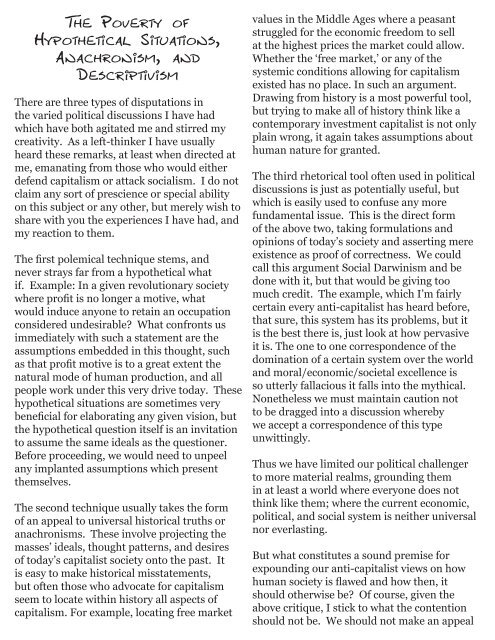Illegitimi non carborundum
Illegitimi non carborundum
Illegitimi non carborundum
Create successful ePaper yourself
Turn your PDF publications into a flip-book with our unique Google optimized e-Paper software.
The Poverty of<br />
Hypothetical Situations,<br />
Anachronism, and<br />
Descriptivism<br />
There are three types of disputations in<br />
the varied political discussions I have had<br />
which have both agitated me and stirred my<br />
creativity. As a left-thinker I have usually<br />
heard these remarks, at least when directed at<br />
me, emanating from those who would either<br />
defend capitalism or attack socialism. I do not<br />
claim any sort of prescience or special ability<br />
on this subject or any other, but merely wish to<br />
share with you the experiences I have had, and<br />
my reaction to them.<br />
The first polemical technique stems, and<br />
never strays far from a hypothetical what<br />
if. Example: In a given revolutionary society<br />
where profit is no longer a motive, what<br />
would induce anyone to retain an occupation<br />
considered undesirable? What confronts us<br />
immediately with such a statement are the<br />
assumptions embedded in this thought, such<br />
as that profit motive is to a great extent the<br />
natural mode of human production, and all<br />
people work under this very drive today. These<br />
hypothetical situations are sometimes very<br />
beneficial for elaborating any given vision, but<br />
the hypothetical question itself is an invitation<br />
to assume the same ideals as the questioner.<br />
Before proceeding, we would need to unpeel<br />
any implanted assumptions which present<br />
themselves.<br />
The second technique usually takes the form<br />
of an appeal to universal historical truths or<br />
anachronisms. These involve projecting the<br />
masses’ ideals, thought patterns, and desires<br />
of today’s capitalist society onto the past. It<br />
is easy to make historical misstatements,<br />
but often those who advocate for capitalism<br />
seem to locate within history all aspects of<br />
capitalism. For example, locating free market<br />
values in the Middle Ages where a peasant<br />
struggled for the economic freedom to sell<br />
at the highest prices the market could allow.<br />
Whether the ‘free market,’ or any of the<br />
systemic conditions allowing for capitalism<br />
existed has no place. In such an argument.<br />
Drawing from history is a most powerful tool,<br />
but trying to make all of history think like a<br />
contemporary investment capitalist is not only<br />
plain wrong, it again takes assumptions about<br />
human nature for granted.<br />
The third rhetorical tool often used in political<br />
discussions is just as potentially useful, but<br />
which is easily used to confuse any more<br />
fundamental issue. This is the direct form<br />
of the above two, taking formulations and<br />
opinions of today’s society and asserting mere<br />
existence as proof of correctness. We could<br />
call this argument Social Darwinism and be<br />
done with it, but that would be giving too<br />
much credit. The example, which I’m fairly<br />
certain every anti-capitalist has heard before,<br />
that sure, this system has its problems, but it<br />
is the best there is, just look at how pervasive<br />
it is. The one to one correspondence of the<br />
domination of a certain system over the world<br />
and moral/economic/societal excellence is<br />
so utterly fallacious it falls into the mythical.<br />
Nonetheless we must maintain caution not<br />
to be dragged into a discussion whereby<br />
we accept a correspondence of this type<br />
unwittingly.<br />
Thus we have limited our political challenger<br />
to more material realms, grounding them<br />
in at least a world where everyone does not<br />
think like them; where the current economic,<br />
political, and social system is neither universal<br />
nor everlasting.<br />
But what constitutes a sound premise for<br />
expounding our anti-capitalist views on how<br />
human society is flawed and how then, it<br />
should otherwise be? Of course, given the<br />
above critique, I stick to what the contention<br />
should not be. We should not make an appeal














![The Philosophy of Progress [pdf]](https://img.yumpu.com/14077359/1/190x245/the-philosophy-of-progress-pdf.jpg?quality=85)

